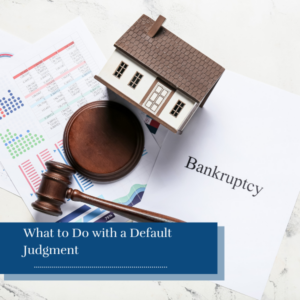What to Do with a Default Judgment

When you can’t pay your debts in North Carolina, your creditors can take legal action against you to recover the money you owe. In many cases, your creditors may file a lawsuit against you. If a creditor obtains a judgment against you, they can then take action to enforce the judgment. Your creditors may be able to seize non-exempt property you own.
At Sasser Law Firm, our North Carolina bankruptcy lawyers have advised thousands of clients and prospective clients that are facing lawsuits, unsatisfied judgments, and executions.
What Is a Default Judgment?
A default judgment is a ruling that a court hands down when someone fails to respond to a lawsuit. Default judgments favor the plaintiff-creditor. Because the defendant did not respond to the plaintiff’s lawsuit or appear in court, this ruling is automatic and generally results in a money judgment for the full amount owed along with other costs.
A default judgment might seem frightening but don’t panic if you get one. There are various options for managing such situations.
What Happens After a Default Judgment?
So, what happens after a default judgment is issued? After your creditor has obtained a judgment against an individual (i.e. not a registered entity) defendant, that creditor can then serve out a Notice of Right to Claim exemption. The judgment debtor has 20 days from the date of service to complete the form and get it filed with the appropriate clerk of court. If there are assets that are non-exempt then those assets are vulnerable to being seized by the sheriff as part of a judgment execution. Of particular concern are bank levies and vehicles being sold.
In some cases, the judgment is a lien on real property in the county. This step might lead to the forced sale of non-exempt assets, such as your home or car, to satisfy the debt. That said, a sheriff sale of real property in North Carolina is not common. Many judgment creditors are content to wait until the judgment debtor sells the real property or refinances to collect on the judgment lien. A default judgment can impact a credit score.
Options for Fighting a Default Judgment
If your creditors obtain a default judgment against you, there are several steps you can take to fight the court’s decision. Those steps could include:
- Motion to Vacate or set aside: You could file a motion to vacate the judgment, basically requesting the court to set the default judgment aside if you can prove you weren’t properly served or there was a legitimate reason for your absence in court.
- Negotiate a Settlement: In some cases, you might be able to negotiate a settlement with your judgment creditor. They may be willing to accept a reduced sum or agree to a payment plan to settle the debt. This could prevent further collection actions against you.
- Bankruptcy: Filing for bankruptcy can potentially help you discharge certain debts and provide relief from collection activities, including those stemming from a default judgment.
Contact an Experienced Bankruptcy Lawyer Today
If you’re facing a default judgment, an attorney may be able to help you explore your options and find the best path forward. The North Carolina bankruptcy lawyers at Sasser Law Firm may be able to assist you. Call us today at (919) 319-7400 or complete our contact form for a free consultation.
- About the Author
- Latest Posts
For more than 20 years, the Sasser Law Firm has been helping individuals and business owners sort through financial hardships to see the light at the end of the tunnel. Our North Carolina bankruptcy attorneys are all board-certified specialists, which means we have passed a complex exam, undergone a thorough peer review, and continue to earn legal education credits in this ever-evolving area of law.














